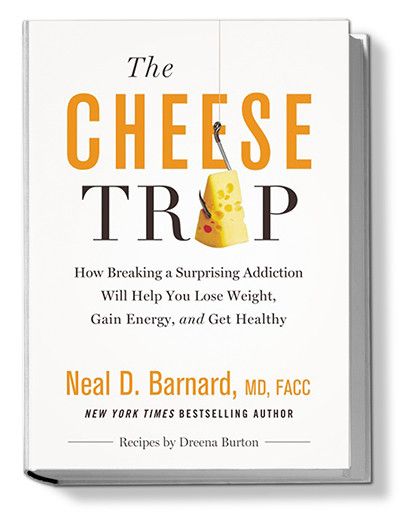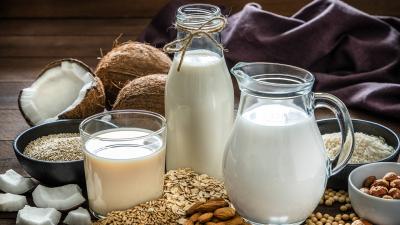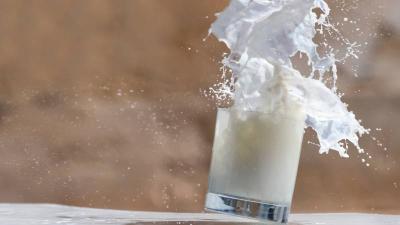Health Concerns About Dairy
Avoid the Dangers of Dairy With a Plant-Based Diet
Milk and other dairy products are the top source of saturated fat in the American diet, contributing to heart disease, type 2 diabetes, and Alzheimer’s disease. Studies have also linked dairy to an increased risk of breast, ovarian, and prostate cancers.
Saturated Fat and Heart Disease
Milk and other dairy products are the top sources of artery-clogging saturated fat in the American diet. Milk products also contain cholesterol. Diets high in fat, saturated fat, and cholesterol increase the risk of heart disease, which remains America’s top killer. For more information, see our Cholesterol page. Cheese is especially dangerous. Typical cheeses are 70% fat.1
Lactose Intolerance
Infants and children produce enzymes that break down lactose, the sugar found in breast milk and cow’s milk, but as we grow up, many of us lose this capacity. Lactose intolerance is estimated to affect 68% of people globally and 42% of Americans.2 Symptoms include stomach cramps, diarrhea, and gas.
Bone Health
Research shows that dairy products have little or no benefit for bone health. According to an analysis published in the British Medical Journal, most studies fail to show any link between dairy intake and broken bones, or fractures.3 In one study, researchers tracked the diets, exercise, and stress fracture rates of adolescent girls and concluded that dairy products and calcium do not prevent stress fractures.4 Another study of more than 96,000 people found that the more milk men consumed as teenagers, the more bone fractures they experienced as adults.5 Learn about how to build strong bones on a plant-based diet.
Cancer
Research has linked the high fat content and hormones in milk, cheese, and other dairy products to breast cancer.
A 2017 study funded by the National Cancer Institute that compared the diets of women diagnosed with breast cancer to those without breast cancer found that those who consumed the most American, cheddar, and cream cheeses had a 53% higher risk for breast cancer, while yogurt was associated with a lower risk, suggesting that the high saturated fat content in cheese may play a role.6
The Life After Cancer Epidemiology study found that, among women previously diagnosed with breast cancer, those consuming one or more servings of high-fat dairy products (e.g., cheese, ice cream, whole milk) daily had a 49% higher breast cancer mortality, compared with those consuming less than one-half serving daily.7
Research funded by the National Cancer Institute, the National Institutes of Health, and the World Cancer Research Fund, found that women who consumed 1/4 to 1/3 cup of cow’s milk per day had a 30% increased chance for breast cancer. One cup per day increased the risk by 50%.8
High intakes of dairy products including whole and low-fat milk increase the risk for prostate cancer, according to a meta-analysis that looked at 32 studies.9 In another study, men who consumed three or more servings of dairy products a day had a 141% higher risk for death due to prostate cancer compared to those who consumed less than one serving.10
But avoiding dairy products and eating a more plant-based diet may help protect the prostate. A study published in the American Journal of Clinical Nutrition found that men who followed a vegan diet had a 35% lower prostate cancer risk than those following a nonvegetarian, lacto-ovo-vegetarian, pesco-vegetarian, or semi-vegetarian diet.11
Skin Health
Dairy is associated with an increased risk of acne. Just one glass of cow’s milk each day increases the odds of acne by 41%.12 Dairy has also been identified as a common trigger for chronic, inflammatory skin conditions like eczema and psoriasis.13-14 Drinking milk is associated with shortened telomeres (the caps on your chromosomes), which are associated with premature aging and wrinkles.15
Why You Should Choose Soy Milk Instead
Replacing dairy milk with soy milk may have several health advantages. One cohort of over 50,000 North American women found that replacing the average intake of dairy milk with soy milk was associated with a 32% lower risk of breast cancer.8 While in men, non-fermented soy products, including tofu and soy milk, are associated with a 30% reduced relative risk of prostate cancer according to a meta-analysis.16
Soy milk has also been found to be a heart-healthy choice, as it reduces several risk factors for heart disease including total and LDL cholesterol, blood pressure, and inflammatory markers according to a meta-analysis of randomized controlled trials.17
Ditch the dairy and choose soy milk instead to improve your skin and reduce your risk of diseases like breast cancer and heart disease.
Dr. Roxanne Becker, MBChB, DipIBLM, Medical Editor and Educator, Physicians Committee
Plant-Powered Prescription for Dairy
- Choose water or unsweetened soy milk as your preferred beverage.
- Replace dairy milk with soy milk in cooking and baking recipes.
- In the case of a soy allergy, choose another unsweetened, nondairy milk such as almond or oat milk.
Dairy Is Unhealthy? Convince Me
Dr. Neal Barnard responds to a viewer who is adamant that dairy is an essential part of the diet. They say without it it is impossible to achieve optimal health.
Health Concerns About Dairy Fact Sheet
Many Americans, including some vegetarians, still consume substantial amounts of dairy products. And government policies still promote these products, despite scientific evidence that questions their health benefits and indicates their potential health risks. Though dairy is marketed as an essential food for strong bones, there is more to the story. Some important things to consider include potential health problems like heart disease, certain cancers, digestive problems, and type 1 diabetes.
Further Reading
More on Dairy
DID YOU KNOW?
High dairy consumption increases overall mortality.
References
- U.S. Department of Agriculture. FoodData Central. Accessed March 26, 2024. https://fdc.nal.usda.gov/
- Storhaug CL, Fosse SK, Fadnes LT. Country, regional, and global estimates for lactose malabsorption in adults: a systematic review and meta-analysis. Lancet Gastroenterol Hepatol. 2017;2(10):738-746. doi:10.1016/S2468-1253(17)30154-1
- Bolland MJ, Leung W, Tai V, et al. Calcium intake and risk of fracture: systematic review. BMJ. 2015;351:h4580. doi:10.1136/bmj.h4580
- Bolland MJ, Leung W, Tai V, et al. Calcium intake and risk of fracture: systematic review. BMJ. 2015;351:h4580. 2015;351:h4580. doi:10.1136/bmj.h4580
- Feskanich D, Bischoff-Ferrari HA, Frazier AL, Willett WC. Milk consumption during teenage years and risk of hip fractures in older adults. JAMA Pediatr. 2014;168(1):54-60. doi:10.1001/jamapediatrics.2013.3821
- McCann SE, Hays J, Baumgart CW, Weiss EH, Yao S, Ambrosone CB. Usual consumption of specific dairy foods is associated with breast cancer in the Roswell Park Cancer Institute data bank and biorepository. Curr Dev Nutr. 2017;1(3):e000422. doi:10.3945/cdn.117.000422
- Kroenke CH, Kwan ML, Sweeney C, Castillo A, Caan BJ. High- and low-fat dairy intake, recurrence, and mortality after breast cancer diagnosis. J Natl Cancer Inst. 2013;105(9):616-623. doi:10.1093/jnci/djt027
- Fraser GE, Jaceldo-Siegl K, Orlich M, Mashchak A, Sirirat R, Knutsen S. Dairy, soy, and risk of breast cancer: those confounded milks. Int J Epidemiol. 2020;49(5):1526-1537. doi:10.1093/ije/dyaa007
- Aune D, Navarro Rosenblatt DA, Chan DS, et al. Dairy products, calcium, and prostate cancer risk: a systematic review and meta-analysis of cohort studies. Am J Clin Nutr. 2015;101(1):87-117. doi:10.3945/ajcn.113.067157
- Yang M, Kenfield SA, Van Blarigan EL, et al. Dairy intake after prostate cancer diagnosis in relation to disease-specific and total mortality. Int J Cancer. 2015;137(10):2462-2469. doi:10.1002/ijc.29608
- Tantamango-Bartley Y, Knutsen SF, Knutsen R, et al. Are strict vegetarians protected against prostate cancer? Am J Clin Nutr. 2016;103(1):153-160. doi:10.3945/ajcn.114.106450
- Juhl CR, Bergholdt HKM, Miller IM, Jemec GBE, Kanters JK, Ellervik C. Dairy intake and acne vulgaris: a systematic review and meta-analysis of 78,529 children, adolescents, and young adults. Nutrients. 2018;10(8):1049. doi:10.3390/nu10081049
- Nosrati A, Afifi L, Danesh MJ, et al. Dietary modifications in atopic dermatitis: patient-reported outcomes. J Dermatolog Treat. 2017;28(6):523-538. doi:10.1080/09546634.2016.1278071
- Afifi L, Danesh MJ, Lee KM, et al. Dietary behaviors in psoriasis: patient-reported outcomes from a U.S. national survey. Dermatol Ther (Heidelb). 2017;7(2):227-242. doi:10.1007/s13555-017-0183-4
- Tucker LA. Milk fat intake and telomere length in U.S. women and men: the role of the milk fat fraction. Oxid Med Cell Longev. 2019;2019:1574021. doi:10.1155/2019/1574021
- Yan L, Spitznagel EL. Soy consumption and prostate cancer risk in men: a revisit of a meta-analysis. Am J Clin Nutr. 2009;89(4):1155-1163. doi:10.3945/ajcn.2008.27029
- Sohouli MH, Lari A, Fatahi S, et al. Impact of soy milk consumption on cardiometabolic risk factors: a systematic review and meta-analysis of randomized controlled trials. J Funct Foods. 2021;83:104499. doi:10.1016/j.jff.2021.104499












